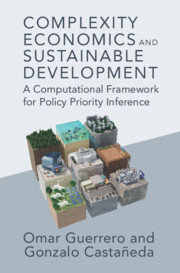 Complexity Economics and Sustainable Development
Complexity Economics and Sustainable Development Book contents
- Frontmatter
- Dedication
- Contents
- Figures
- Tables
- Foreword
- Acknowledgments
- Abbreviations
- Part I A Complexity Approach to Sustainable Development
- 1 Introduction
- 2 Policy Prioritisation, Complexity, and Agent Computing
- 3 Relevant Data and Empirical Challenges
- 4 A Computational Model
- 5 Calibration and Validation
- Part II A Global View of Sustainable Development
- Part III A Focalised View of Sustainable Development
- Bibliography
- Index
5 - Calibration and Validation
from Part I - A Complexity Approach to Sustainable Development
Published online by Cambridge University Press: 04 January 2024
- Frontmatter
- Dedication
- Contents
- Figures
- Tables
- Foreword
- Acknowledgments
- Abbreviations
- Part I A Complexity Approach to Sustainable Development
- 1 Introduction
- 2 Policy Prioritisation, Complexity, and Agent Computing
- 3 Relevant Data and Empirical Challenges
- 4 A Computational Model
- 5 Calibration and Validation
- Part II A Global View of Sustainable Development
- Part III A Focalised View of Sustainable Development
- Bibliography
- Index
Summary
This chapter elaborates on the calibration and validation procedures for the model. First, we describe our calibration strategy in which a customised optimisation algorithm makes use of a multi-objective function, preventing the loss of indicator-specific error information. Second, we externally validate our model by replicating two well-known statistical patterns: (1) the skewed distribution of budgetary changes and (2) the negative relationship between development and corruption. Third, we internally validate the model by showing that public servants who receive more positive spillovers tend to be less efficient. Fourth, we analyse the statistical behaviour of the model through different tests: validity of synthetic counterfactuals, parameter recovery, overfitting, and time equivalence. Finally, we make a brief reference to the literature on estimating SDG networks.
Keywords
- Type
- Chapter
- Information
- Complexity Economics and Sustainable DevelopmentA Computational Framework for Policy Priority Inference, pp. 129 - 164Publisher: Cambridge University PressPrint publication year: 2024
